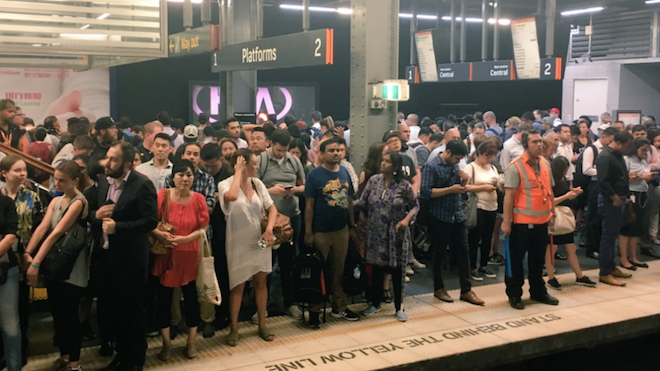Choo-Choo: the trains stay on track
 City Desk •
City Desk •  Friday, January 26, 2018
Friday, January 26, 2018 Industrial bulletin ... Behind the scenes as the Fair Work Commission comes to grips with the threatened Sydney train strike ... Michael Harmer and the harm to his law firm ... Anxious school children made more anxious if train drivers didn't turn up for work ... Loose arguments aplenty ... Ryan Hunter on the case
 Sydney rail commuters delighted to be travelling againIT was a bumpy (once delayed, twice adjourned) start at the Fair Work Commission as Senior Deputy President Jonathan Hamberger heard claims from Harmers Workplace Lawyers, Sydney/NSW Trains and the NSW Minister for Industrial Relations-cum-Treasurer Dom Perrottet all seeking to halt January's industrial action by NSW rail workers.
Sydney rail commuters delighted to be travelling againIT was a bumpy (once delayed, twice adjourned) start at the Fair Work Commission as Senior Deputy President Jonathan Hamberger heard claims from Harmers Workplace Lawyers, Sydney/NSW Trains and the NSW Minister for Industrial Relations-cum-Treasurer Dom Perrottet all seeking to halt January's industrial action by NSW rail workers.
The government sought to have the whole thing wrapped up on January 24, saying there was no time to wait despite having served 13 affidavits (one 200 plus pages long) only hours before on the Rail, Tram & Bus Union (RTBU) and Professionals Australia (aka APESMA).
By seeking to adjourn, those rail workers were accused of trying to undermine the Foo Fighters' much anticipated visit to Sydney Olympic Park and forcing the rail operator to run the weekend timetable on a Saturday and Sunday.
The star of the adjournment applications was solicitor Michael Harmer, who was only just building-up steam when he was told he was "not helpful" and to "please sit down" by Hamberger SDP.
In the spectator's box, a few on the union side whispered disparaging things about the quality of Mr Harmer's arguments and the quantity of gel in his hair.
They presumably were missing the finer points of his submission that he was simply there to save the unions the $100 million they would have to pay to compensate for all the theoretically lost economic output in NSW if the industrial action was later ruled to not be protected.
He also claimed to be an "affected person" because his employees wouldn't be able to get to work if there was a train strike, which he claimed was not a "protected industrial action". Hamberger said the strike was protected, suggesting that even if Harmer's argument was heard it wouldn't have got far.
Late in the day (Jan. 24) the CFMEU joined the fracas seeking costs against Harmers, which apparently had served the union with notice to appear, despite the CFMEU not partaking in the industrial action.
After that, Harmer faded from the limelight. His claim was put on hold after the government's claims, being told he would only be heard if the government did not succeed.
Sydney/NSW Trains and the minister then mustered a battalion of public servants to describe every corner of Sydney-siders' lives that would be put out by the industrial action.
Models from the Treasury showed $50 million in lost output on the day of the stop work order, and another $40 million over the course of the overtime ban. These estimates (which the unions admitted they didn't have time to find an expert to refute) seemed to garner support from the bench.
Evidence that the five percent of school students who are diagnosed with anxiety would be made more anxious still by the stresses of late-running trains carried less weight.
When Hamberger asked whether parents would really be sending these kiddies on the train system at all - especially during chaotic industrial action - the minister abandoned that argument.
Ultimately the commission found that the industrial action must be stopped under s.424 of the Fair Work Act. HH said that both the alternate elements in the section had been made out: that it threatened "to endanger the welfare of the population or a part of it", and "to cause significant damage to the Australian economy or an important part of it". (Sydney being an important part because it is the largest and most economically significant city in Australia.)
Industrial action by the unions is suspended until March 8, 2018.
The decision is perhaps an inevitability of the Fair Work Act, which the International Labour Organisation has repeatedly reminded Australia desperately needs to be rewritten to bring us up to speed with our international obligation to protect the right to strike.
 Sydney trains will be back on track
Sydney trains will be back on track
By finding that the welfare of the population and the economy would be put endangered, Hamberger was not giving any ground to the unions. Under cross-examination each of the rail operator's best men conceded that mitigation strategies were already in place to ensure safety on and around the tracks at all times, overtime or not.
Anthony Howell for the unions said this was no different to the crowds at NYE or the Sydney Olympics. Michael Seck for the Sydney & NSW Trains reminded the commission that the Act doesn't require a "significant" risk to welfare (as it does with harm to the economy), and so even one worried student stuck unsupervised on a crowded platform would in theory enliven the mandatory requirement to prevent the industrial action.
If this argument did win the day (full reasons are yet to come) it leaves little room for future industrial action in the transport sector.
Ryan Hunter reporting










Reader Comments